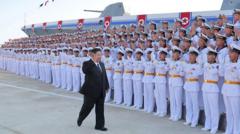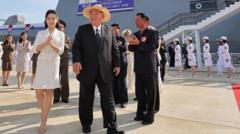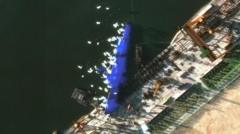Following the capsizing of a warship, Kim Jong Un's response highlights his focus on bolstering loyalty to the regime while advancing North Korea's naval capabilities, suggesting a political strategy that embraces transparency over concealment.
North Korea's Naval Aspirations: Lessons from a Warship's Mishap

North Korea's Naval Aspirations: Lessons from a Warship's Mishap
Analysis of Kim Jong Un's reaction to the capsizing of a new warship reveals deeper insights into North Korea's regime and its ambitions.
In a recent incident that has captivated attention worldwide, North Korea's new warship, during its launch, capsized, igniting a flurry of international interest and analysis. While no casualties were reported and damage seemed manageable, the incident is more compelling for the reaction it elicited from Kim Jong Un and the subsequent actions taken.
Immediately following the mishap, Kim Jong Un condemned the failure as a "criminal act" detrimental to the nation's "dignity," leading to swift repairs and the arrest of four party officials linked to the incident. Experts argue that this reaction provides valuable insights into the North Korean leadership's psyche and strategic aims, especially regarding its naval ambitions.
Despite possessing an expanding nuclear arsenal, North Korea's maritime forces remain significantly weaker than those of its adversaries such as South Korea and the United States. Former South Korean navy captain Choi Il notes that this incident illustrates the regime's challenges in building a competitive naval fleet capable of carrying nuclear capabilities.
The warship in question represents a crucial step in Kim's vision of modernizing North Korea's naval capabilities. It is one of two newly constructed destroyers vying for greater operational prowess in a military landscape dominated by superior foreign fleets.
The capsizing incident was particularly embarrassing as Kim was present, alongside his daughter, during the launch. Observers note that the event was likely intended to showcase North Korea's military advancements and pride, making the failure all the more humiliating.
For Kim Jong Un, the incident revealed an opportunity to turn a public relations crisis into a demonstration of accountability. Analysts, including Rachel Minyoung Lee from the Stimson Centre, underscore the significance of Kim's decision to publicly address the failure, a move away from previous approaches that favored obscuring negative events. This shift signifies an evolving propaganda strategy that thrives on transparency.
In a remarkable display of resilience, the warship was restored just weeks after its capsizing — a feat that took many naval experts by surprise. Kim's attendance at the relaunching ceremony not only reclaimed a narrative of success but also reinforced loyalty among the populace toward the regime. By attributing the incident to "carelessness," and lauding a deceased worker's contribution, Kim adeptly shifted the focus from failure to a compelling narrative of devotion and progress.
Observers warn that while North Korea's naval ambitions may seem laughable to outsiders, the regime's determination to enhance its capabilities, including aspirations of conducting pre-emptive nuclear strikes, poses a real concern that demands vigilance from the international community.
As North Korea forges ahead with its objectives, the lessons drawn from this incident highlight both Kim Jong Un's strategic acumen in propaganda and the continual evolution of North Korea's military ambitions. The world's response to these developments will be crucial as it navigates the challenges posed by a rapidly advancing North Korea.
Immediately following the mishap, Kim Jong Un condemned the failure as a "criminal act" detrimental to the nation's "dignity," leading to swift repairs and the arrest of four party officials linked to the incident. Experts argue that this reaction provides valuable insights into the North Korean leadership's psyche and strategic aims, especially regarding its naval ambitions.
Despite possessing an expanding nuclear arsenal, North Korea's maritime forces remain significantly weaker than those of its adversaries such as South Korea and the United States. Former South Korean navy captain Choi Il notes that this incident illustrates the regime's challenges in building a competitive naval fleet capable of carrying nuclear capabilities.
The warship in question represents a crucial step in Kim's vision of modernizing North Korea's naval capabilities. It is one of two newly constructed destroyers vying for greater operational prowess in a military landscape dominated by superior foreign fleets.
The capsizing incident was particularly embarrassing as Kim was present, alongside his daughter, during the launch. Observers note that the event was likely intended to showcase North Korea's military advancements and pride, making the failure all the more humiliating.
For Kim Jong Un, the incident revealed an opportunity to turn a public relations crisis into a demonstration of accountability. Analysts, including Rachel Minyoung Lee from the Stimson Centre, underscore the significance of Kim's decision to publicly address the failure, a move away from previous approaches that favored obscuring negative events. This shift signifies an evolving propaganda strategy that thrives on transparency.
In a remarkable display of resilience, the warship was restored just weeks after its capsizing — a feat that took many naval experts by surprise. Kim's attendance at the relaunching ceremony not only reclaimed a narrative of success but also reinforced loyalty among the populace toward the regime. By attributing the incident to "carelessness," and lauding a deceased worker's contribution, Kim adeptly shifted the focus from failure to a compelling narrative of devotion and progress.
Observers warn that while North Korea's naval ambitions may seem laughable to outsiders, the regime's determination to enhance its capabilities, including aspirations of conducting pre-emptive nuclear strikes, poses a real concern that demands vigilance from the international community.
As North Korea forges ahead with its objectives, the lessons drawn from this incident highlight both Kim Jong Un's strategic acumen in propaganda and the continual evolution of North Korea's military ambitions. The world's response to these developments will be crucial as it navigates the challenges posed by a rapidly advancing North Korea.





















